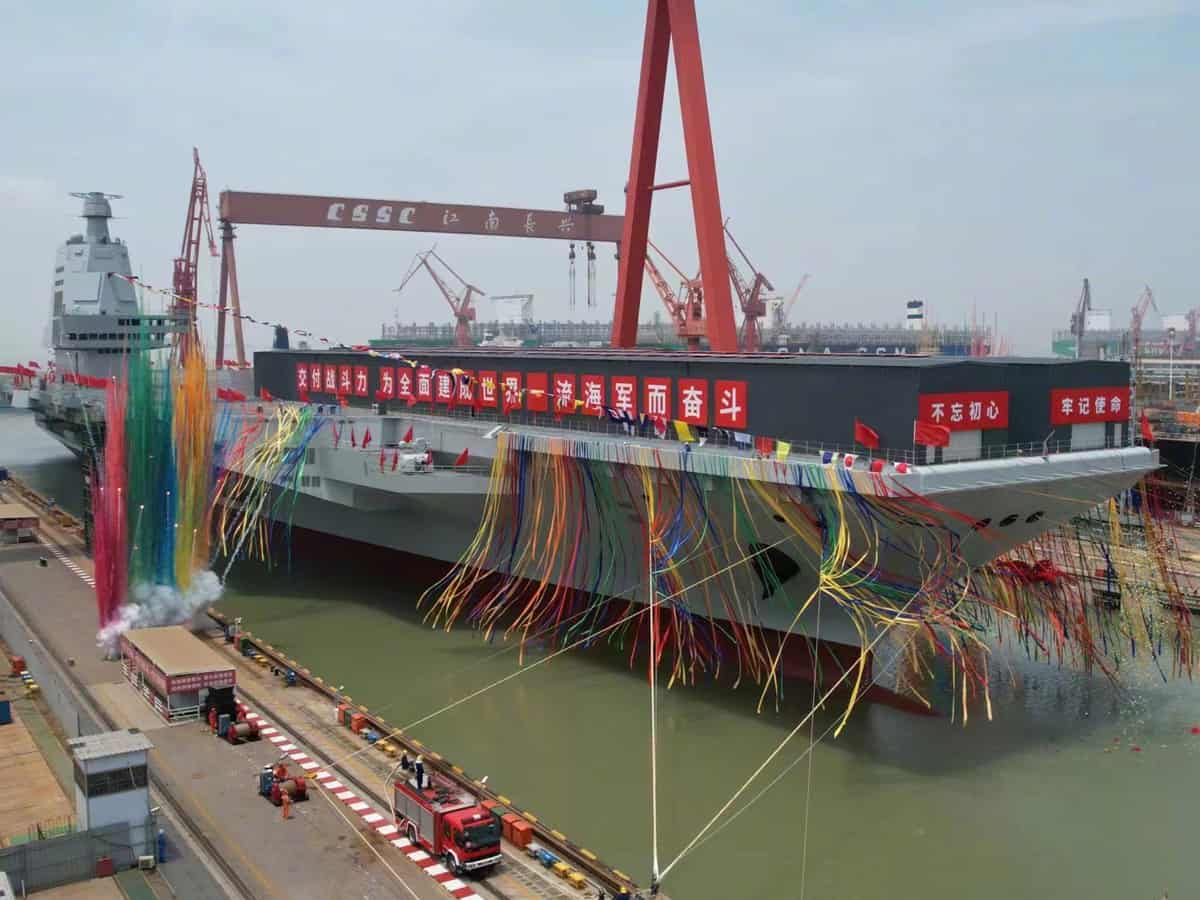
Beijing: China on Friday launched its third aircraft carrier, the country’s most advanced as well as the first “fully domestically built” naval vessel, as an aggressive Beijing sought to extend the range of its navy in the strategic Indo-Pacific region.
The aircraft carrier named ‘Fujian’ was launched at a brief ceremony held at the Shanghai’s Jiangnan Shipyard, the official media reported from the eastern metropolis.
The Fujian is China’s first domestically designed and built catapult aircraft carrier, state-run Xinhua news agency reported.
The launch of the ship was delayed by two months due to the COVID lockdown of Shanghai. It was due to be launched on April 23 around the 73rd anniversary of the People’s Liberation Army Navy (PLAN).
The 3rd aircraft carrier built by China State Shipbuilding Corporation Limited has a displacement of more than 80,000 tonnes and is equipped with electromagnetic catapults and arresting devices.
Fujian is the name of China’s eastern coastal province of Fujian.
China’s first aircraft carrier, the ‘Liaoning’, was a refit of the Soviet-era ship commissioned in 2012 followed by the indigenously built 2nd aircraft carrier ‘Shandong’ in 2019. Liaoning and Shandong are names of two provinces of China.
China plans to have around five aircraft carriers, according to the official media. The next aircraft carrier China plans to build is expected to be nuclear-powered. The ship Fujian was launched at a short but festive ceremony, the daily report said.
A launch and naming ceremony was held at about 11 am, when the naming certificate of the vessel was given to the top officer to receive delivery of the aircraft carrier.
Officials then cut the ribbon marking the launch of the third aircraft carrier, after which the vessel left the dock, concluding the ceremony.
The Fujian, which is the “first fully domestically developed and constructed” aircraft carrier with catapults, has a flat, straight flight deck equipped with electromagnetic catapults and arresting devices, and has a full displacement of more than 80,000 tonnes, the report said.
After the launch, the carrier will start mooring trials and sea trials.
Xu Qiliang, a member of the Political Bureau of the ruling Communist Party of China Central Committee and vice-chairman of the Central Military Commission, attended the ceremony.
It is the most advanced aircraft carrier built by China, state broadcaster CCTV reported.
China’s naval buildup comes amid growing geopolitical tensions with the US, which under President Joe Biden is seeking to strengthen ties with allies and partners in the Asia-Pacific region to counter Beijing’s growing economic influence and military might.
Fujian, in the southeast, is the closest province to Taiwan, a self-ruling province that China says must be reunified with the mainland, even by force.
Last week, China’s Defence Minister General Wei Fenghe accused the US of supporting the island’s independence, saying it was “violating its promise on Taiwan” and “interfering” in China’s affairs.
Wei reportedly told US Defence Secretary Lloyd Austin that China would “resolutely crush any attempt” at Taiwan’s independence.
Meanwhile, the official media reported that the Type 003 warship with a hull number of 18, is the first carrier in China’s fleet to use an electromagnetic catapult to launch planes from the deck, which is faster than the older steam catapult system.
Political slogans written in large white Chinese characters against a red background were attached to shelters on the deck, apparently, to protect the catapults, the Hong Kong-based South China Morning Post reported.
Deliver combat power fighting to fully build a world-class navy, read a banner.
The advanced catapult system, called the electromagnetic aircraft launch system (EMALS), is more energy-efficient and reduces maintenance. It is used also on the US Navy’s Gerald R. Ford-class carriers, the Post reported.
Unlike China’s other two aircraft carriers, which are equipped with ski-jump take-off ramps, the Fujian features a flat-top flight deck.
State-run CCTV said the testing of the carrier’s mooring and navigation systems will be the first priority after Friday’s launch.
Recent reports, however, said the speedy launch of the aircraft carriers is resulting in technical issues and repairs delaying their operational readiness.
China’s first aircraft carrier, the Liaoning, is so far the only Chinese aircraft carrier with the initial operational capability or the basic level of combat readiness.
Chinese President Xi Jinping, who heads the military besides the ruling Communist Party of China, has carried out extensive reforms of the military, including downsizing the Army and enhancing the role of the Navy and Air force as Beijing set its sights on global expansion with military bases in Djibouti in the Horn of Africa.
China has also taken over Sri Lanka’s Hambantota port for a 99-year lease and expanded and modernised Pakistan’s Gwadar port in the Arabian Sea.
China is engaged in hotly contested territorial disputes in both the South China Sea and the East China Sea. Beijing has built up and militarised many of the islands and reefs it controls in the region. Both areas are stated to be rich in minerals, oil and other natural resources and are vital to global trade.
China claims almost all of the South China Sea. Vietnam, the Philippines, Malaysia, Brunei and Taiwan have counter claims over the area.



